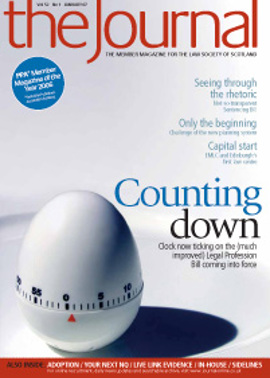Strength of purpose

After a lengthy consultation and legislative process, the Legal Profession and Legal Aid (Scotland) Bill was given final approval in the Scottish Parliament last month – but only after a number of key amendments during a well-informed stage 3 debate.
The principle of establishing an independent Scottish Legal Complaints Commission to handle service complaints against lawyers remains. However, concessions were made on a number of points argued by the Society from the outset. In order to ensure greater compliance with the European Convention on Human Rights, an appeal to the Court of Session against decisions of the Commission, on limited grounds and only with leave of the court, was introduced and it was also agreed that the Lord President should be involved in the appointment and removal of its board members and consulted on its rules. A proposed new process that would have led to the Society or Faculty of Advocates being held in contempt of court – with the President or Dean facing the possibility of imprisonment or a fine – for failing to comply with a recommendation of the Commission, was also dropped!
It is worth remembering that other concessions were won at an earlier stage, including withdrawal of the provision to charge solicitors a case fee even if a case against them was unfounded, and the insertion of other measures to distance the Commission from government. The Society argued robustly for an improved system to benefit both the profession and the public, and many of those views were taken on board as MSPs reached broad cross-party consensus. Enormous credit and thanks are due to the Society’s bill team for their tremendously hard work and achievements. However, it would not have been possible to convey the strength of feeling among the profession, had it not been for the efforts of individual practitioners taking up issues with their MSPs or in the local press. Their role in the process cannot be overestimated.
The Society will continue to examine the amendments before the legislation receives royal assent, although our hope remains that an improved system, which retains the confidence of solicitors and their clients, will now be established. We will continue to work where possible with the Scottish Executive and the Commission to highlight any areas of concern. The new system will bring change and not all of this may be welcome.
December also saw the launch of the Society’s annual report on equality and diversity, which highlights a year of achievement in those fields, and the Society’s Disability Equality Scheme. These are not just about meeting mandatory legal standards: rather they are part of work to ensure that the Society and profession are, and are seen to be, regulating and working in a way that is fair and accessible to all. Perhaps the most notable theme in both documents is the real engagement of the wider profession, whether it is the 3,000-plus solicitors who responded to the Profile of the Profession study, the 50 individuals who attended the service accessibility review (relating to people with disabilities), or the members who have signed up to be part of the Society’s Equality Forum. They all performed a valuable role. It is vital for a body such as the Society to work with its members, and we are grateful to everyone who has helped us move to a position where we are now respected for our work in this field.
Education and training continues to be an important topic and I have noted the gathering momentum of debate in several other jurisdictions, with particular focus on outcomes-based training. A common theme during this period of potential change is the need for consultation with the profession. The Society launched its biggest ever consultation on precisely this subject in November and hundreds of solicitors have responded. It is encouraging that so many people recognise at least some changes are needed, and are providing positive and insightful suggestions. The standard of those entering the profession affects us all, and I encourage those who have not yet contributed to use the last few weeks of the consultation (which closes on 9 February) to register their views on any subject from undergraduate degrees to continuing professional development. They can do so online at the Society’s website.
Congratulations to the Journal editor, Peter Nicholson, and all those associated with publishing the magazine for winning two prestigious awards. Receiving both the Business & Professional Design of the Year and Member Magazine of the Year titles at the Scottish Magazine Awards was due recognition for their achievements. A great deal of effort and commitment has gone into ensuring the Journal is the most popular, interesting and respected source of information about the profession and the law in Scotland. The publishers, Connect Communications, have also been awarded a five-year renewal of their contract. The partnership has certainly worked well to date and I expect will continue to go from strength to strength.
I would like to take the opportunity to wish everyone a happy and prosperous 2007.
In this issue
- The Isle of Man
- Contractual handcuffs: enhanced redundancy rights
- Strength of purpose
- Cleared for take-off
- Countdown phase
- A quiet revolution
- Acting your age
- Adopting new solutions
- Clear as mud?
- Majoring in minorities
- Believe in the future
- Appreciation: Dr J Stuart Fair
- Grow your own assistant
- On the radar
- Status of the expert's report
- Rewarding experience
- Restructuring - in hindsight
- Court rules catch up with live link TV
- Scottish Solicitors' Discipline Tribunal
- Website reviews
- Book reviews
- Top notch training
- A clearer way to deal
- Not the best option
- Letting in the disabled
- Single survey: have your say






